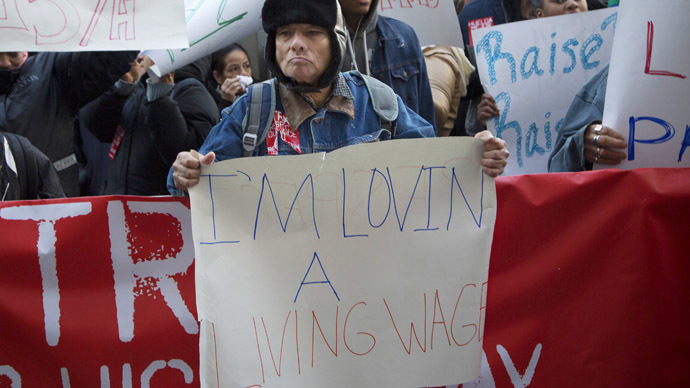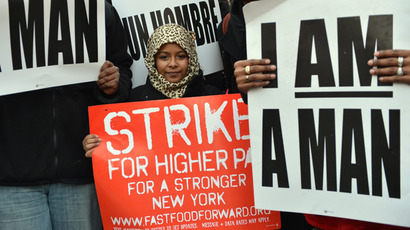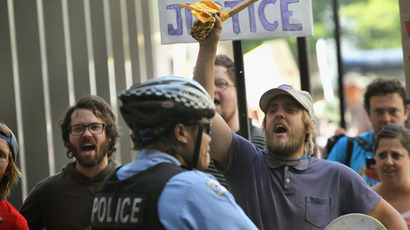US fast-food workers stage nationwide strike over low wages

Thousands of fast-food employees are set to organize walkout strikes across the US on Thursday, demanding that restaurant chains such as McDonald’s, Taco Bell and Wendy’s double their pay.
Workers insist that the corporations should pay them $15 an hour,
the equivalent of about $31,000 a year for full-time employees.
The minimal federal salary is $15,000 a year, with most fast-food
workers getting only the legal minimum of $7.25 an hour, AP
reported.
Thursday’s walkout is set to become the largest strike staged by
fast-food workers, organizers say. So far, the record was 2,200
people in the summer, protesting in seven cities across the US.
Last November, a series of walkouts by fast-food workers started
in New York, spreading across the nation to Chicago, Detroit and
Seattle.
Martin Rafanan, a community organizer in St. Louis, Missouri,
said that if the situation doesn’t improve the corporations who
employ low-paid workers will “pull all the blood, sweat, tears
and money” out of local communities.
"If you're paying $7.25 an hour and employing someone for 20, 25 hours a week, which is the average here, they're bringing home about $10,000 a year. You can't survive on that," Reuters reported Rafanan as saying.

However, the National Restaurant Association, the trade group for
US restaurants and fast-food chains, said the problem was
exaggerated.
"Only 5 percent of restaurant employees earn the minimum wage,
and those that do are predominantly working part-time and half
are teenagers," Scott DeFife, the organization's executive
vice president for policy and government affairs, told Reuters.
The National Employment Law Project, a group campaigning for an
end of low pay, estimates the current median wage for fast-food
workers at $8.94 per hour, according to official data. Nearly all
jobs in fast-food restaurants are non-union, and the group says
workers often face retaliation from employers for taking part in
strikes, Reuters reported.
The wave of protests comes at the same time as President Barack
Obama’s government is mulling an increase of the federal minimal
wave to $9 an hour, much less than demanded by the strikers.
So far, the main problem of the protest movement was low
awareness of the events, with the turnout for the past strikes
being relatively low in some cities.
In response to the movement’s demands, McDonald's said in a
statement that pay for its workers starts at minimum wage but the
range goes higher, depending on the employee's position and
experience. If the salary was higher, menu prices would go up as
well, the company said.
"That would potentially have a negative impact on employment
and business growth in our restaurants, as well as value for our
customers," McDonald’s said.
Wendy's and Yum Brands, which owns KFC, Pizza Hut and Taco Bell, did not respond to AP’s request for comment.















